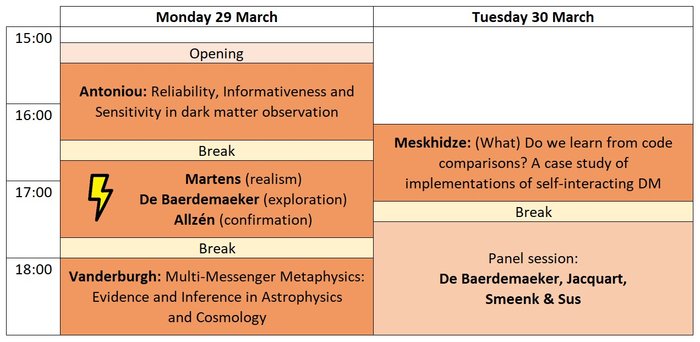29-30 March 2021 – via Zoom
Workshop on
Philosophy of Dark Matter

Philosophy of Dark Matter Workshop
29-30 March 2021 – via Zoom
Registration Deadline: 22 March 2021
speakers | registration | schedule | contact
Following up on the 2019 conference in Aachen on dark matter & modified gravity, and a special journal issue (in progress) on the same topic, the DFG-funded research unit Epistemology of the LHC and the Lichtenberg Group for History and Philosophy of Physics are organising a two-day workshop on the philosophy of dark matter. This workshop will take place on 29 and 30 March 2021. Philosophers, physicists, historians, sociologists and other interested scholars are invited to attend.
According to the standard model of cosmology, ΛCDM, the mass-energy budget of our universe includes roughly five times as much dark matter (DM) as the baryonic matter familiar to us from the standard model of particle physics. On the one hand, ΛCDM manages to connect an impressive range of phenomena at various scales, and has achieved a high degree of empirical confirmation. On the other hand, structure formation simulations involving dark matter run into a number of small scale challenges and fail to account for observed galactic correlations. Moreover, the exact nature of dark matter remains shrouded in mystery, despite particle physicists developing a cornucopia of ingenious particle dark matter models. In light of a persistent lack of non-gravitational detection of dark matter, the landscape of DM candidates spans 90 orders of magnitude in mass (!), ranging from ultralight bosons to primordial black holes. Some have gone as far as to suggest that it is a modification of the gravitational field rather than postulating a new form of matter that is required to account for all the data.
Despite the hunt for dark matter having been a large and important research programme in physics for decades now, the humanities have largely ignored it. However, dark matter, lying at the intersection of cosmology, astronomy and particle physics, provides a rich topic for philosophical exploration. This workshop will address some of the following research topics related to dark matter:
Descriptive questions:
- Which of the following factors have shaped and are shaping the DM research programme, and how: empirical data, theoretical virtues, idealisation, philosophical motivations and guiding principles, historical factors, sociological factors?
- How do constraints from cosmology, astronomy and particle physics interact?
- Which notions of direct and indirect observation/detection are relevant?
- Is the DM research programme in a crisis?
- Is the development of the DM research programme best understood via a Popperian, Kuhnian, Lakatosian, Laudanian or other analysis?
- What kind of underdetermination, if any, is there between dark matter and its modified gravity alternative?
Normative/epistemological/methodological questions:
- What is the epistemic status, robustness, and explanatory power of DM simulations and the various methods of DM detection/observation?
- What would it take to confirm that a new non-luminous particle discovered at the LHC is the cosmic DM particle?
- What would it take to abandon the DM research programme?
- Which criteria for theory choice could break the underdetermination, if any, between dark matter and modified gravity?
- Should dark matter be explored independently from dark energy?
- How should funding be distributed?
- What are good strategies for integrating dark matter, modified gravity and the humanities?
Semantic/metaphysical questions:
- What would it mean to currently be a scientific realist about dark matter?
- Do different communities mean the same thing when they talk about ‘dark matter’?
- What makes one field a dark matter field and another field a modification of the gravitational field? Are dark matter & modified gravity mutually incompatible?
CONFIRMED SPEAKERS & PANEL MEMBERS
Speakers:
Simon Allzén, Stockholm University (Sweden) | web
Antonis Antoniou, University of Bristol (UK) | web
Siska de Baerdemaeker, Stockholm University (Sweden) | web
Niels Martens, University of Bonn & RWTH Aachen University (Germany) | web
Helen Meskhidze, University of California Irvine (USA) | web
William L. Vanderburgh, California State University San Bernardino (USA) | web
Panel:
Siska de Baerdemaeker, Stockholm University (Sweden) | web
Melissa Jacquart, University of Cincinnati (USA) | web
Christopher Smeenk, Western University (Canada) | web
Adán Sus, University of Valladolid (Spain) | web
Registration
We invite participants from physics and from philosophy, history and sociology of physics/science, as well as anyone else who may be interested. In order to register for this online workshop, please fill in this form by 22 March 2021. Registration is free. There is a maximum of 100 participants. Registered participants will receive the Zoom-links several days before the workshop.
Schedule
We invite participants from physics and from philosophy, history and sociology of physics/science, as well as anyone else who may be interested. In order to register for this online workshop, please fill in this form by 22 March 2021. Registration is free. There is a maximum of 100 participants. Registered participants will receive the Zoom-links several days before the workshop.
Organization & Contact
This workshop is organised by the project LHC, dark matter & gravity within the interdisciplinary, DFG-funded research unit Epistemology of the LHC, in collaboration with the Lichtenberg Group for History and Philosophy of Physics. In case of any further questions, please contact the organiser, Niels Martens (University of Bonn & RWTH Aachen University) via nmartens[at]uni-bonn.de.
